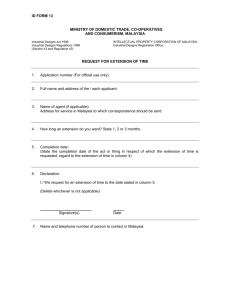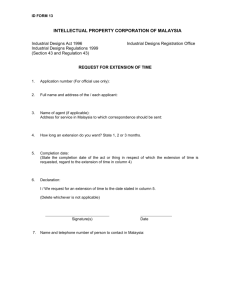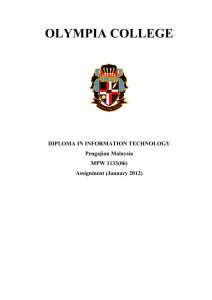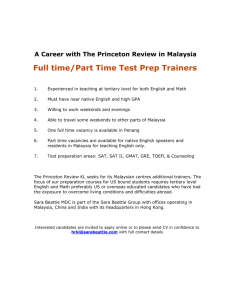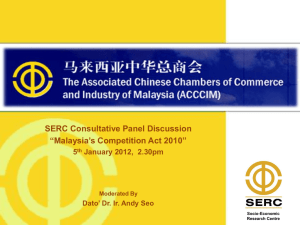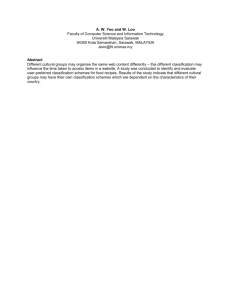SCMP - Economics
advertisement
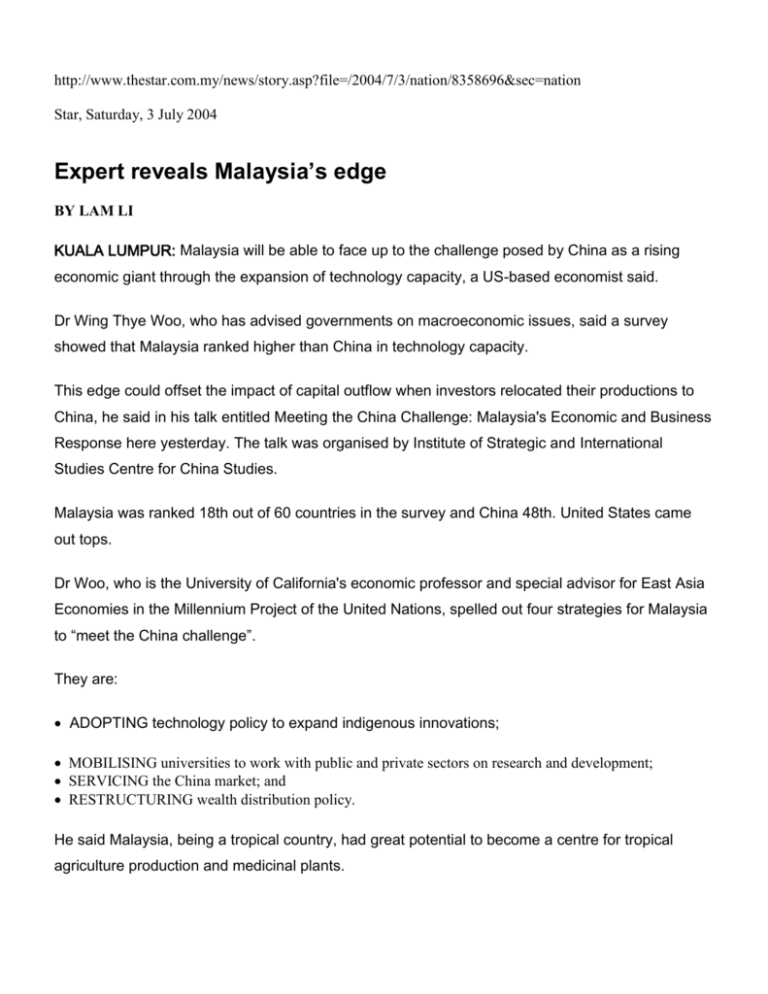
http://www.thestar.com.my/news/story.asp?file=/2004/7/3/nation/8358696&sec=nation Star, Saturday, 3 July 2004 Expert reveals Malaysia’s edge BY LAM LI KUALA LUMPUR: Malaysia will be able to face up to the challenge posed by China as a rising economic giant through the expansion of technology capacity, a US-based economist said. Dr Wing Thye Woo, who has advised governments on macroeconomic issues, said a survey showed that Malaysia ranked higher than China in technology capacity. This edge could offset the impact of capital outflow when investors relocated their productions to China, he said in his talk entitled Meeting the China Challenge: Malaysia's Economic and Business Response here yesterday. The talk was organised by Institute of Strategic and International Studies Centre for China Studies. Malaysia was ranked 18th out of 60 countries in the survey and China 48th. United States came out tops. Dr Woo, who is the University of California's economic professor and special advisor for East Asia Economies in the Millennium Project of the United Nations, spelled out four strategies for Malaysia to “meet the China challenge”. They are: ADOPTING technology policy to expand indigenous innovations; MOBILISING universities to work with public and private sectors on research and development; SERVICING the China market; and RESTRUCTURING wealth distribution policy. He said Malaysia, being a tropical country, had great potential to become a centre for tropical agriculture production and medicinal plants. “To avoid going back to a primary industries economy, Malaysia – which is ahead of many Asean countries and China in technological field – should invest in R&D and sell the findings and technologies. “For example, aquaculture is a lucrative business but it caused many ecological problems; Malaysia can develop technologies to overcome this problem and sell them as value-added products and services.” Dr Woo said Malaysia could also present itself as the “best bachelor on the block” for foreign investors looking for a “China+1” plan. “Malaysia has to work its way to become the '1' by providing better infrastructure, technology ability and skilled workers,” he said. Business Times within The New Straits Times, 3 July 2004 http://www.btimes.com.my/Current_News/BTimes/Saturday/Nation/20040703010151/Article/pp_index_html Malaysia needs to understand China market By KANG SIEW LI GIVEN China’s emergence as an export power, Malaysia needs to continuously improve its technological capability and understanding of the Chinese market, says a leading US economist. University of California Professor of Economics, Dr Woo Wing Thye said China’s accession to the World Trade Organisation (WTO) in November 2001 has resulted in some diversion of foreign direct investments (FDI) away from Malaysia. “Due to such diversions, we expect Malaysia’s gross domestic product (GDP) growth by 2020 to be 5 per cent lower than originally envisaged. In other words, Malaysia’s GDP will continue to grow, but at a slower rate,” he said in his special address on “Meeting the China Challenge: Malaysia’s Economic and Business Response” in Kuala Lumpur yesterday. Woo said, however, China’s emergence will not hurt Malaysia’s economy at all if the latter were able to offset the rate of technological diffusion. He said one of the ways to improve the country’s technological capability is to change the way politics are done. “Successful economic restructuring may require us to think about how we can achieve our political goals differently. For example, we have to come up with ideas of how we could achieve the restructuring of ownership (in local companies) in a more economically efficient manner,” he added. Woo explained that the current 30 per cent Bumiputera equity shareholding in Malaysian companies may be a reason why some of them are reluctant to expand abroad. “The requirement means a potential loss of control. That’s why some firms prefer not to grow. “However, we have to realise that ultimately, the engine of growth is the domestic private sector. Thus, the 30 per cent target could perhaps be achieved through other means such that it does not hold back the growth of the private sector in Malaysia.” he said. Another policy that needs changing is the immigration policy. “The current immigration policy actually encourages uneducated, low-skill labour and discriminates against educated skilled labour from, for example, India, Hong Kong or Taiwan. I mean, it is easier to come to Malaysia as a maid or a paid citizen rather than as an engineer in a high-technology industry,” said Woo. “However, demographic trends have made such policy unnecessary. It has a good reason at one time, but the world has changed. The Malay community is now a very confident, capable group,” he added. Woo said local institutions of higher learning should also gear themselves toward not just building national identity, but national prosperity. “Universities are a good vehicle for technology transfer. However, it is shocking to see that, for example, while the economic base of Penang is electronics, Universiti Sains Malaysia has only a faculty of a minimum size in the information industry. “Basically there has been a disconnection between the universities and the businesses, and thus we have to restructure our universities such that partnerships between academics and businesses are possible,” he said. While China poses a formidable competitive threat to Malaysia, it also provides vast opportunities, said Woo. “Most multinational corporations are sensible to diversify their production into several countries to reduce risk. Thus, there will always be a China+1 scenario and Malaysia could be that one,” he said. He added that for Malaysia to be chosen is not a matter of luck. It had to work on it. “But Malaysia has got a good thing going in and that is has a much better infrastructure and higher education level than its competitors in South-East Asia. But Malaysians have to make sure that they keep acquiring new skills so that they can actually do the job when the opportunity comes,” he added. ©New Straits Times (M) Berhad http://www.bharian.com.my/m/BHarian/Saturday/Ekonomi/20040702231034/Article/ Berita Harian, 3 Jul 04 Negara kekal destinasi pilihan pelabur asing MALAYSIA akan terus menjadi destinasi bagi kemasukan pelaburan langsung asing (FDI) di sebalik kemunculan China sebagai sebuah pusat pengeluaran kos rendah. Profesor Ekonomi University of California, Amerika Syarikat, Dr Woo Wing Thye, (gambar) berkata ini kerana sebagai sebuah negara yang mempunyai prasarana terbaik dan rakyat yang berpendidikan tinggi, Malaysia berpotensi menjadi pilihan untuk syarikat multinasional (MNC) menjadikannya sebagai pusat sokongan untuk operasi mereka di China. “Walaupun banyak MNC beralih ke China sebagai pangkalan pengeluaran di Asia, mereka masih perlu melabur di negara lain di rantau ini bagi menyokong kegiatan pengembangan mereka di negara itu. “Ini dikenali sebagai konsep China+1 yang mana MNC ini menjadikan China sebagai lokasi pengeluaran, tetapi pada masa sama turut melabur di negara lain seperti Malaysia bagi memantapkan operasi di rantau ini,” katanya. Beliau berkata demikian kepada pemberita selepas menyampaikan ceramah ‘Menangani Cabaran China: Maklum Balas Ekonomi dan Perniagaan Malaysia’ di Institut Strategik dan Kajian Antarabangsa (Isis) Malaysia, Kuala Lumpur, semalam. Dengan mengambil Intel Corporation sebagai contoh, Woo yang juga Penasihat Kanan bagi Ekonomi Asia Timur Pertubuhan Bangsa-Bangsa Bersatu (PBB), berkata pengeluar cip berpangkalan di Amerika Syarikat itu terus menjadikan Malaysia sebagai lokasi pelaburan strategiknya, meskipun mempunyai pelaburan besar di China. Namun anak kelahiran Pulau Pinang itu berpendapat, bagi memastikan Malaysia terus dipilih oleh MNC dalam konsep China+1 itu, Malaysia perlu sentiasa meningkatkan daya saingnya berbanding negara serantau lain dengan memberikan tumpuan kepada pembangunan teknologi. “Malaysia masih boleh meningkatkan produktiviti dan kecekapan khususnya dalam pengeluaran komoditi seperti sawit, getah dan sebagainya.” katanya. “Dalam pada itu, perlu wujud kerjasama di kalangan pusat pengajian tinggi dengan masyarakat perniagaan bagi membolehkan lebih banyak pembangunan dan penyelidikan dijalankan,” katanya. Beliau berkata, negara ini juga perlu melaksanakan pendekatan strategik khususnya dalam mewujudkan dasar dan peraturan yang bersesuaian dengan keadaan semasa terutama bagi membawa masuk pekerja profesional asing. Woo berkata, sektor swasta Malaysia juga perlu merebut peluang bagi memanfaatkan pengembangan ekonomi China dan lebih cenderung mengembangkan operasi mereka berasaskan kepada kegiatan eksport. Mengambil Taiwan sebagai contoh, Woo berkata, pengembangan sektor swasta negara itu yang berasaskan eksport dan pembangunan teknologi sudah memberikan kesan positif kepada ekonominya. “Pada 1995, jumlah per kapita Keluaran Dalam Negara Kasar Taiwan adalah sama dengan Malaysia tetapi kini Taiwan sudah berkembang tiga kali ganda,” katanya. ©New Straits Times (M) Berhad http://www.utusan.com.my/utusan/content.asp?y=2004&dt=0703&pub=Utusan_Malaysia&sec=Ekonomi&pg=ek_05.htm Utusan Melayu, 3 July 2004 Malaysia berpotensi jadi rakan usahasama China Oleh JOHARDY IBRAHIM KUALA LUMPUR 2 Julai - Seorang ahli ekonomi University of California kelahiran Pulau Pinang berkata, Malaysia berpotensi menjadi rakan China dalam teori China Campur Satu, jika negara ini terus kekal berusaha mendapatkan kemahiran yang diperlukan. Profesor Dr. Wing Thye Woo berkata, Malaysia memiliki kelebihan daya saing dari segi infrastruktur bertaraf dunia selain tahap pendidikan yang lebih tinggi berbanding lain-lain negara jirannya di Asia Tenggara. Menurutnya, di bawah teori China Campur Satu itu, China dan negara terpilih tersebut akan bergabung dari segi kepakaran untuk menawarkan produk dan perkhidmatan secara bersama ke pasaran global. Beliau menaruh keyakinan kerajaan negara ini akan mampu mempromosikan Malaysia untuk dipilih oleh China sebagai rakan dagangnya yang satu itu. ``Saya yakin kita akan mampu menguasai sebahagian daripada rantaian pengeluaran yang boleh diadakan menerusi ASEAN dan menjadi pakar dalam proses perkilangan,'' katanya. Beliau berkata demikian semasa menyampaikan ceramah bertajuk ``Menghadapi Cabaran China: Maklum Balas Ekonomi dan Perniagaan Malaysia'' anjuran Institut Kajian Strategik dan Antarabangsa (ISIS) di sini, hari ini. Dr. Wing berkata, peningkatan paras pelaburan langsung asing (FDI) ke Malaysia memberi isyarat bahawa wujud suatu sekatan kepada sektor swasta negara ini untuk berkembang. Beliau mengaitkan teori tersebut dengan China, yang semasa zaman dasar komunisnya menghalang sektor swastanya, ia memberi peluang kepada syarikat asing. Dalam konteks ini, beliau menyarankan kerajaan Malaysia supaya terus menekankan kepada pelaksanaan dasar-dasar yang pro-perniagaan dan tidak mencampur adukkannya dengan sentimen politik semata-mata. ``Misalnya, Malaysia membuka pintu kepada tenaga buruh asing yang rendah kecekapannya tetapi sulit bagi yang berkepakaran bekerja di negara ini. ``Ini akan menyebabkan perkembangan sektor swasta dari segi modal sumber manusia berkualiti,'' ujar beliau. The Edge Daily http://www.theedgedaily.com/cms/content.jsp?id=com.tms.cms.article.Article_7f5543f9-cb73c03a-16a94240-e8d8b18f M'sia to ride on China's growth By Reese Loh Posted 2 July 2004, 6:10pm Malaysia is likely to play a prominent role in supplying the resources needed to fuel China's economic growth as well as serve as an alternative to the country as the destination for foreign direct investment. That is the essence of University of California economics professor Woo Wing Thye's "China-plus-one" presentation at the China Challenges dialogue session organised by the Institute of Strategic and International Studies on July 2. China-plus-one brings forth the idea of a resource and technology-rich neighbouring nation complementing the growth of greater China. "Malaysia has the potential to be the 'one' in the China-plus-one theory if it plays its card right," Woo told reporters on the sidelines of the dialogue. He said there had been growing concern over China's position as the sole supply chain source for world economy since the Severe Acute Respiratory Syndrome (SARS) outbreak in the country last year. "With SARS last year, multinational corporations (MNCs) realised that an alternative market should be sourced to avoid disruption in supply should there be any recurrence in China," he said. Woo said Malaysia would be one of the more favourable countries to be selected given its political stability, availability of better infrastructure and higher technology and education levels compared to other countries in the region. In addition, he said China’s investment had been flowing into Malaysia to boost growth in sectors such as oil & gas, palm oil and other primary industries. "Malaysia will get a part of the chain in specialised manufacturing process," he said. On the recent interest rates hike in United States, Woo said it was unlikely to affect Malaysia’s stand on its interest rates and ringgit peg. "Even the Chinese government had no plans to alter its interest rates and yuan policy." He said Malaysia was more likely to make the move only if China did so. "The country’s macroeconomic policy is moving in the right direction," he said.
